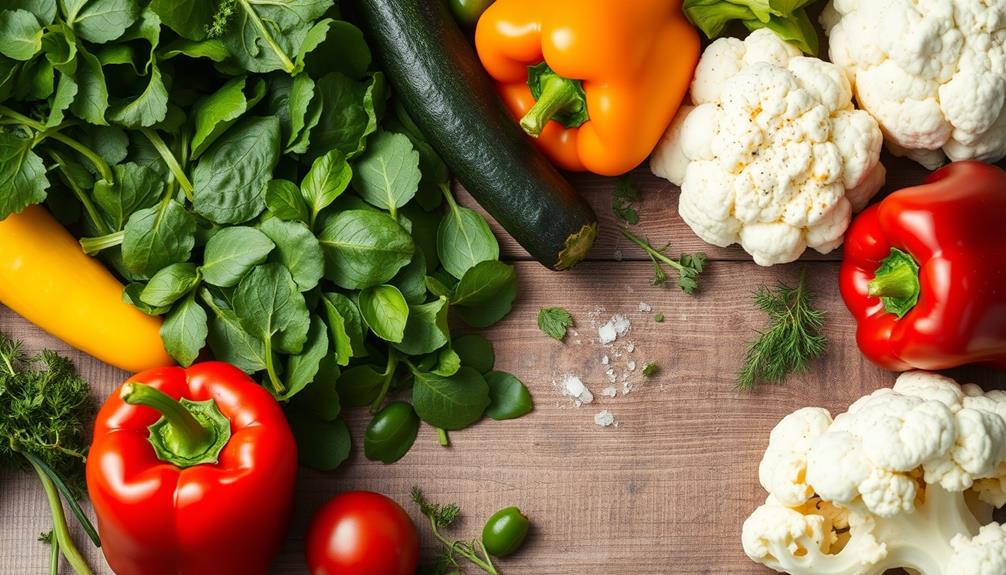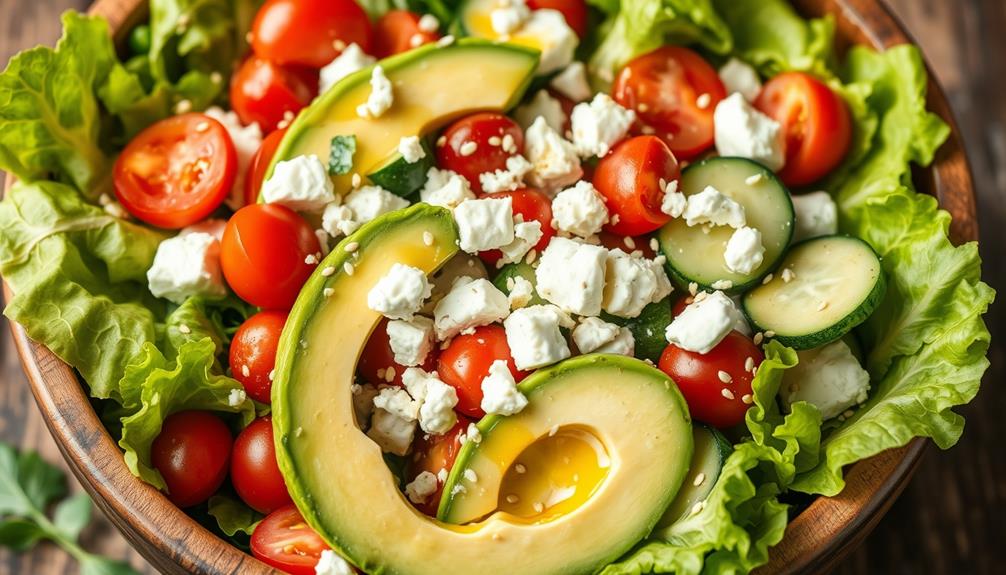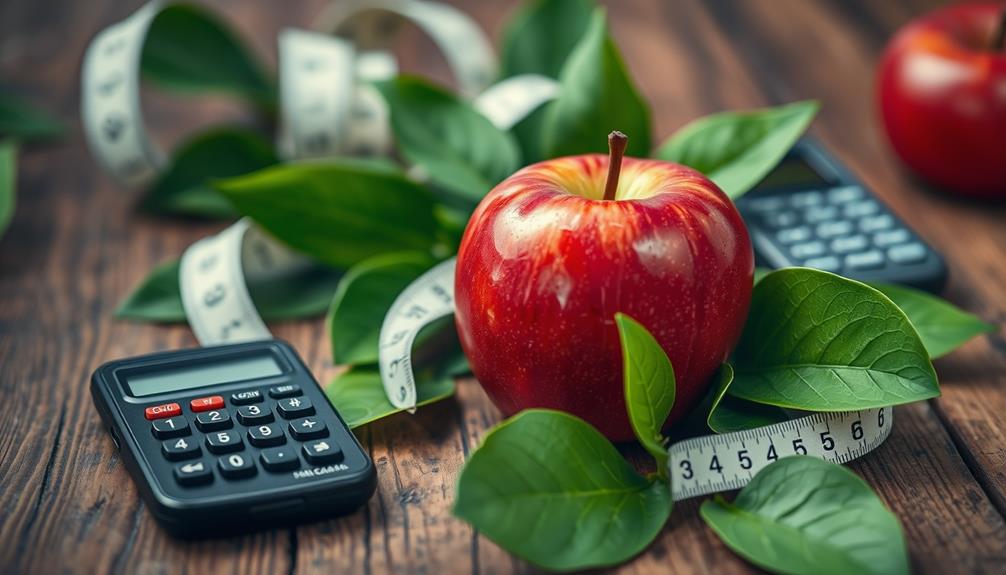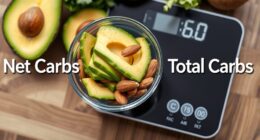On a keto diet, you can enjoy a variety of non-starchy vegetables that keep your carb intake low. Great options include spinach, which has just 1g of carbs per half cup, and cauliflower at 4g per cup. Broccoli, with 8g per medium stalk, and asparagus offer essential nutrients, too. You should limit starchy vegetables like potatoes and corn, as they can disrupt ketosis. Incorporating high-fiber veggies helps with digestion and weight management. Want to discover more about the best cooking methods and seasonal choices for your keto-friendly meals? There's plenty more to explore!
Key Takeaways
- Focus on non-starchy vegetables like spinach, cauliflower, and broccoli, as they contain less than 8g net carbs per serving.
- Include high-fiber options such as arugula and Brussels sprouts to promote satiety and digestive health on a keto diet.
- Choose nutrient-dense vegetables like bell peppers and asparagus for their vitamins, minerals, and antioxidant properties.
- Employ cooking methods like steaming, roasting, or grilling to retain nutrients and enhance flavor without adding carbs.
- Avoid high-carb vegetables such as corn, potatoes, and peas to maintain ketosis and stay within carb limits.
Overview of Keto Vegetables
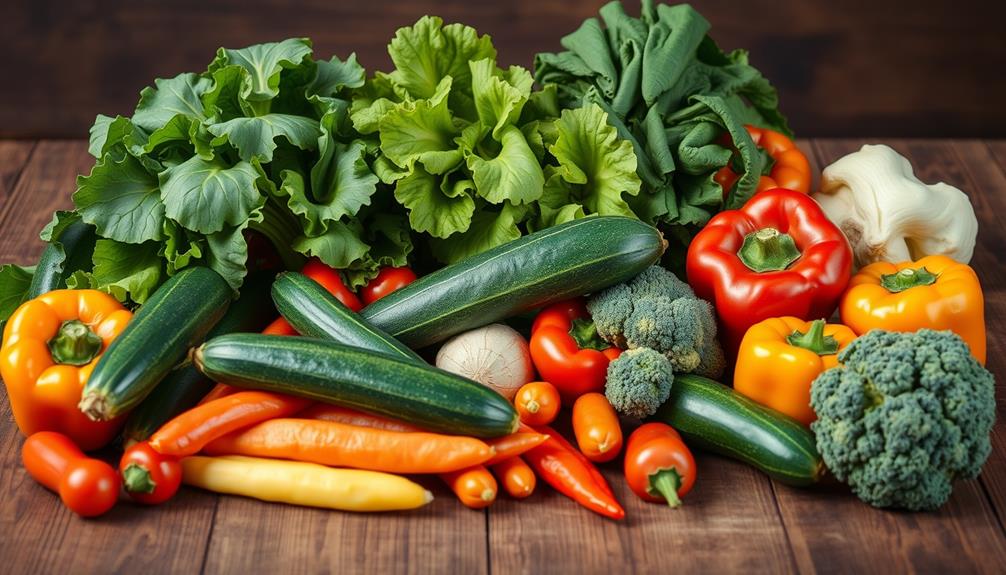
When it comes to your keto diet, choosing the right vegetables is key to staying in ketosis. Non-starchy vegetables are essential, typically containing less than 8 grams of net carbs per cup, making them perfect for your low-carb lifestyle. You'll want to focus on high-fiber options that keep you full and satisfied.
Additionally, incorporating vegetables rich in antioxidants can provide numerous health benefits, which is vital for overall wellbeing beneficial for overall health.
Vegetables like spinach, with just 1g of carbs per half-cup boiled, and asparagus, which has only 2g of carbs in four cooked spears, are nutrient powerhouses. Broccoli and Brussels sprouts are also great choices, each containing about 8g of carbs per serving but packed with fiber and vitamins to support digestion and overall health.
Don't forget about cauliflower, either; with around 4g of carbs in one cup cooked, it's a versatile vegetable that can easily replace higher-carb ingredients in your recipes.
On the other hand, it's essential to limit starchy vegetables like potatoes and corn, which can lead to exceeding your carb limits. By focusing on these keto-friendly vegetables, you'll stay on track while enjoying a variety of flavors and nutrients.
Key Keto-Friendly Options
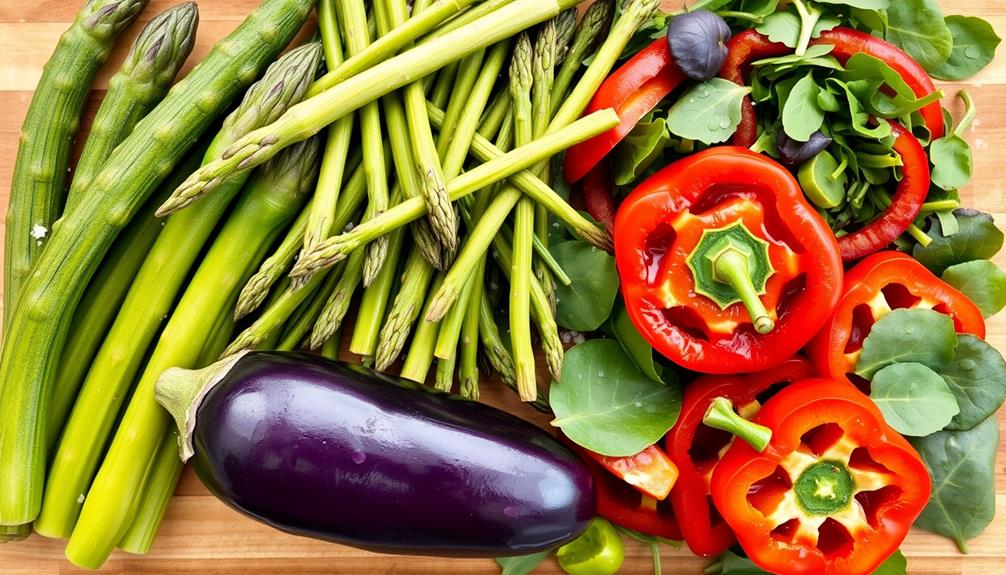
When choosing vegetables for your keto diet, focus on nutrient-dense options that keep your carb count low.
Incorporating a variety of vegetables can provide vital vitamins and minerals, which are critical for overall health.
You'll find that cooking methods can also impact the nutritional value, so it's important to prepare them wisely.
For more tips on cold medications that can help with symptoms while adjusting your diet, let's explore some of the best keto-friendly vegetables that fit these criteria.
Nutrient-Dense Choices
A variety of nutrient-dense vegetables can make your keto diet both satisfying and healthy. By incorporating these options, you'll guarantee you're getting essential vitamins and minerals while keeping your carb intake low.
| Vegetable | Carbs (per serving) | Key Nutrients |
|---|---|---|
| Arugula | 3g (4 cups) | Calcium, Vitamins A & C |
| Spinach | 1g (½ cup, boiled) | Vitamins A & K |
| Cauliflower | 4g (1 cup, cooked) | Versatile, low in carbs |
| Bell Peppers | 7g (1 medium) | Vitamin C (95 mg) |
Broccoli, another excellent choice, contains 8g of carbs in one medium stalk and is loaded with calcium and antioxidants. By adding these vegetables to your meals, you not only enjoy a diverse range of flavors but also benefit from their nutrient profiles. Spinach supports overall health, while bell peppers provide anti-inflammatory benefits thanks to their high vitamin C content. Embracing these nutrient-dense choices can greatly enhance your keto diet while keeping it delicious and fulfilling.
Low-Carb Varieties
Low-carb vegetables are essential for anyone following a keto diet, providing both flavor and nutrition without the excess carbs. Incorporating these key options into your meals helps you stay within your carbohydrate limits while enjoying nutrient-dense choices.
Additionally, certain essential oils, like peppermint oil, can support digestion and overall wellness, complementing your healthy eating habits.
Spinach is a fantastic low-carb option, offering just 1g of carbohydrates per half-cup when boiled. It's packed with vitamins A and K, which support muscle growth and cognitive function.
Broccoli, while slightly higher at 8g of carbohydrates per medium stalk, is an excellent source of calcium, folic acid, and antioxidants that may help reduce inflammation.
Cauliflower stands out as a versatile substitute for rice or pizza crust, containing only 4g of carbohydrates per cooked cup.
Asparagus is another great choice, providing just 2g of carbohydrates in four cooked spears while delivering protein and essential amino acids.
Cooking Methods Matter
Cooking methods play an essential role in maximizing the benefits of vegetables on a keto diet. While raw consumption retains the most nutrients, it's not always practical. Steaming is a better option than boiling for preserving vitamins, allowing you to get the most nutritional value from your veggies.
Additionally, consider incorporating healthy fats when preparing your vegetables, as they align with keto's high-fat requirements and can enhance flavor while promoting nutrient absorption. essential oils for skin conditions can also be beneficial in supporting a holistic approach to health during your dietary changes.
Roasting is another fantastic method, enhancing flavor without adding carbs, making it ideal for keto staples like Brussels sprouts and cauliflower. If you're looking to add a smoky taste, grilling is perfect for zucchini and bell peppers, providing variety in your meals.
Sautéing vegetables in healthy fats like olive oil or coconut oil aligns well with keto's high-fat requirements and enhances flavor. Plus, these fats help you maintain texture, keeping your veggies crisp and enjoyable.
For quick meals, consider quick cooking methods like stir-frying. This method not only preserves texture but also keeps carb counts low, making it a smart choice for your keto lifestyle.
Vegetables to Avoid
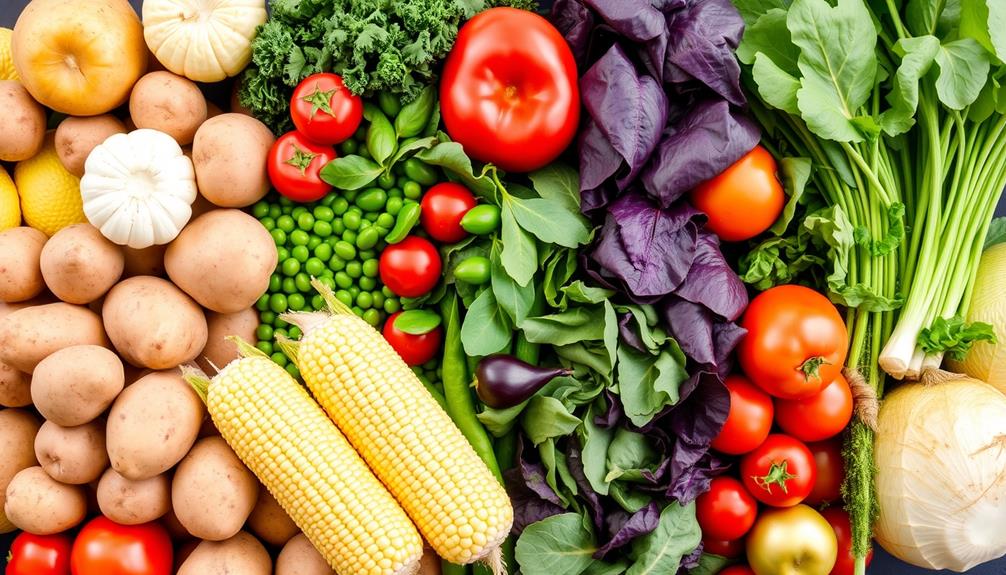
Steering through the keto diet can be challenging, especially when it comes to choosing the right vegetables. To maintain ketosis, it's vital to know which high-carb vegetables to avoid. A balanced diet rich in low-carb options is significant for supporting your overall health, especially when following a ketogenic lifestyle.
Start with green peas, which pack a hefty 20.9g of carbs per cup. Corn isn't much better, with around 19.1g of carbs in a medium ear.
White potatoes are another no-go, offering a whopping 33.4g of carbs in a single medium potato. Sweet potatoes, often mistaken for a healthier option, contain approximately 16.82g of carbs per medium one, making them unsuitable for your keto meal plan.
Incorporating physical activity can help enhance results while on a keto diet.
Beets are nutritious but can be tricky; they've about 13g of net carbs per cup, so consume them sparingly.
Health Benefits of Vegetables
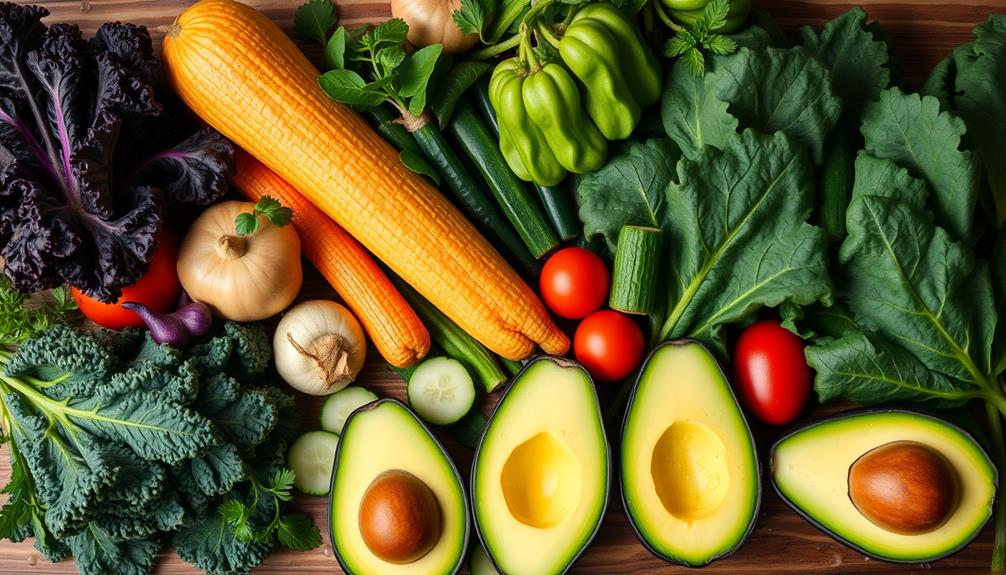
Incorporating a variety of vegetables into your keto diet can greatly enhance your health. The health benefits of vegetables are immense, especially when you choose low-carb options. Non-starchy vegetables like spinach and broccoli are packed with essential vitamins A, C, K, and folic acid that support overall health and boost immune function.
Additionally, incorporating energy-saving features from the ultimate heat pump can provide a comfortable environment to enjoy your healthy meals.
High-fiber vegetables play an important role in managing cholesterol levels and improving heart health, which is critical on a high-fat keto diet. Additionally, the antioxidants present in vegetables help combat oxidative stress, reducing your risk of chronic diseases like heart disease and cancer.
By including a diverse range of low-carb vegetables, you guarantee a balanced nutrition profile, which is often challenging on restricted diets. These vegetables not only aid digestion but also regulate blood sugar levels and promote feelings of fullness, making them indispensable for weight management.
Incorporating a variety of vegetables into your meals will enhance your overall well-being, assuring you reap the benefits of these nutrient-dense foods while staying true to your keto journey.
Cooking Methods for Vegetables
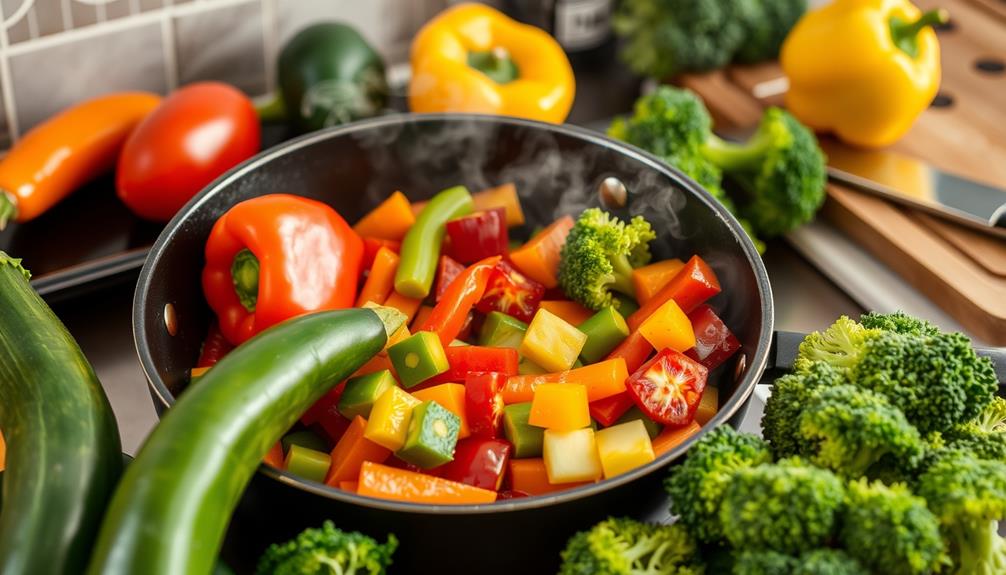
There are several effective methods to prepare vegetables on a keto diet that can enhance both flavor and nutrition. One of the best options is raw consumption. Eating vegetables raw retains the maximum amount of nutrients, making it perfect for boosting your intake of keto-friendly vegetables.
Additionally, utilizing different brewing methods for your beverages can complement your meals and enhance your overall dining experience.
Steaming is another excellent cooking method, as it preserves more vitamins and minerals compared to boiling. This works well for low-carb options like broccoli and asparagus.
If you're looking to enhance natural sweetness, roasting is a fantastic choice. It brings out the flavors in vegetables like cauliflower and Brussels sprouts without adding extra carbs.
Grilling adds a delicious smoky flavor while helping to retain nutritional value. Zucchini, bell peppers, and eggplant are perfect candidates for this method.
Importance of Fiber
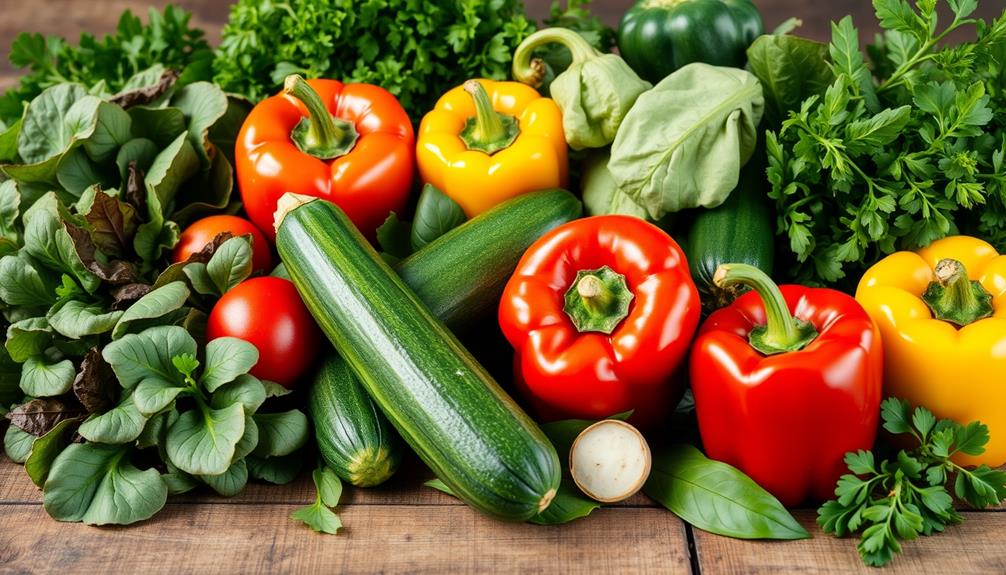
Fiber is vital for your digestive health, especially on a keto diet where low carbs can lead to constipation.
By including high-fiber vegetables, you can help regulate your blood sugar and support weight management.
These benefits make fiber an essential component of your keto-friendly meals.
Digestive Health Benefits
Digestive health plays an important role in overall well-being, and including keto-friendly vegetables in your diet can make a significant difference.
These low-carb vegetables are rich in fiber, which promotes regular bowel movements and helps prevent constipation. A well-managed budget can also support your health goals by allowing you to invest in high-quality, nutritious foods.
By focusing on fiber, you're not just supporting your digestive health; you're also benefiting your gut health and overall wellness financial planning resources.
Here are three key benefits of incorporating fiber-rich vegetables into your keto diet:
- Enhanced Weight Management: High-fiber vegetables like broccoli and Brussels sprouts can help you feel fuller, making it easier to manage your weight.
- Reduced Inflammation: A fiber-rich diet is linked to lower inflammation levels, which can decrease your risk of chronic diseases such as heart disease and type 2 diabetes.
- Stabilized Blood Sugar Levels: Fiber slows glucose absorption, helping to maintain stable blood sugar levels, which is vital for those on a keto diet.
Incorporating a variety of these important vitamins and minerals not only supports your digestive health but also guarantees you're reaping the full benefits of a well-rounded keto lifestyle.
Blood Sugar Regulation
Maintaining stable blood sugar levels is essential for your health, especially when following a keto diet. High-fiber, low-carb vegetables like spinach and broccoli play an important role in this process. They slow the absorption of sugar into your bloodstream, preventing spikes in blood glucose that can disrupt your energy levels and overall well-being.
Additionally, incorporating safe snacks for hamsters can provide inspiration for tasty, low-carb vegetable choices. By integrating these veggies into your meals, you can effectively manage your blood sugar while staying within your carb limits.
Fiber also enhances insulin sensitivity, making it crucial for anyone managing diabetes or prediabetes. This property not only helps regulate blood sugar but also promotes feelings of fullness, reducing the likelihood of overeating. When you're satisfied with your meals, it becomes easier to stick to your ketogenic diet and support weight management.
To meet the recommended daily fiber intake of about 25 grams for women and 38 grams for men, focus on integrating keto-friendly vegetables into your diet. This way, you can enjoy a variety of flavors while still achieving your fiber goals without exceeding your carb limits.
Ultimately, a high-fiber diet is key to maintaining stable blood sugar and supporting your health on a keto journey.
Weight Management Support
How can you effectively support your weight management goals while following a keto diet? One of the best strategies is to incorporate high-fiber vegetables into your meals.
These veggies are low in calories but packed with essential nutrients, making them perfect for maintaining a healthy weight. Additionally, practicing mindful eating and incorporating gentle stretching before meals can enhance your overall well-being and support weight management goals, as suggested in yoga for back pain.
Here are three key benefits of adding high-fiber vegetables to your keto diet:
- Enhanced Feelings of Fullness: Vegetables like broccoli and Brussels sprouts can help you feel satisfied, reducing overall calorie consumption.
- Improved Blood Sugar Control: A diet rich in fiber is linked to better blood sugar management, which is vital for metabolic health.
- Prevention of Constipation: Fiber aids digestion and helps prevent constipation, a common issue for those on a keto diet due to lower carbohydrate intake.
Seasonal Vegetable Choices
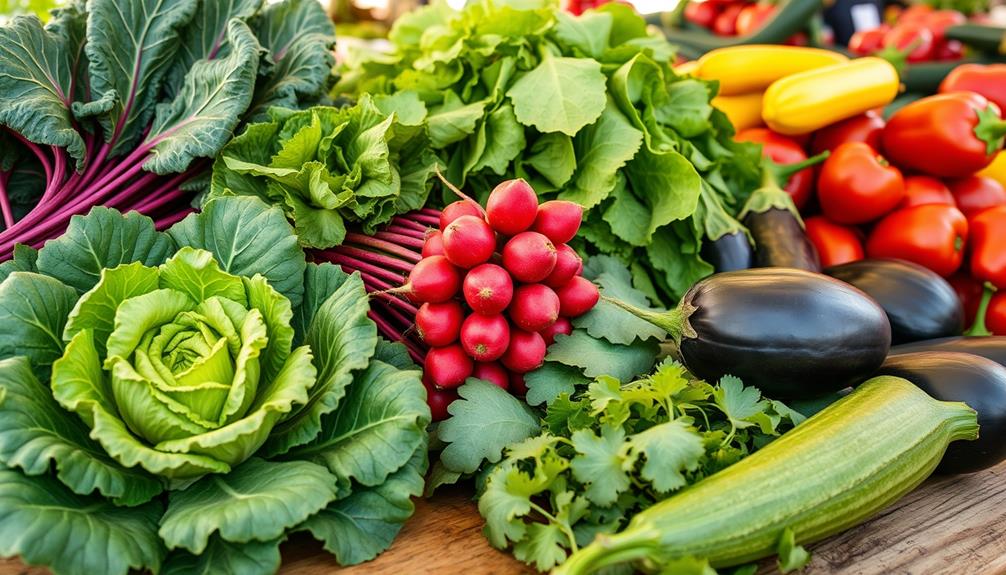
Choosing seasonal vegetables can greatly enhance your keto diet by offering fresher, more flavorful options. Seasonal vegetables, like asparagus in spring and pumpkin in fall, often boast higher nutrient density, packed with essential vitamins and antioxidants while keeping carb counts low. By incorporating these low carb, nonstarchy vegetables, you can elevate your meal variety and creativity, making dishes like zucchini noodles or roasted Brussels sprouts.
Purchasing seasonal produce typically leads to lower costs, as these vegetables are more abundant and locally sourced. For instance, bell peppers and tomatoes shine in late summer, and they make excellent additions to your meals without breaking the bank.
By opting for seasonal choices, you also support local agriculture, which promotes environmentally friendly practices.
During the colder months, vegetables like kale and Brussels sprouts become nutrient-rich powerhouses, ideal for your keto meal planning. They not only provide essential vitamins but also contribute to your overall health with their antioxidant properties.
Embracing seasonal vegetables won't only keep your meals exciting but also align with your keto lifestyle, ensuring you stay on track while enjoying delicious, wholesome food.
Frequently Asked Questions
What Are Keto-Friendly Vegetables?
Keto-friendly vegetables are low-carb, non-starchy options like spinach, kale, and broccoli. You'll want to focus on leafy greens and cruciferous varieties while avoiding starchy choices like corn and potatoes to maintain ketosis. Incorporating the best lowcarb vegetables for keto into your diet can help you stay on track with your macronutrient goals while still enjoying a variety of flavors and nutrients. Zucchini, cauliflower, and bell peppers are also excellent options that can be easily adapted to many dishes. These vegetables not only fit your keto lifestyle but also provide essential vitamins and fiber for overall health.
Can You Eat Salad on Keto?
When it comes to salads on keto, you're in the clear! Load your bowl with leafy greens, non-starchy veggies, and healthy fats. Just watch those dressings—stick to low-carb options to keep your goals intact!
What Vegetables Are off Limits on Keto?
On a keto diet, you should avoid high-carb vegetables like corn, white potatoes, sweet potatoes, green peas, beets, and parsnips. These can disrupt your ketosis and hinder your progress, so choose wisely.
Can I Eat Carrots on Keto?
You can eat carrots on keto, but in moderation. They're higher in carbs, so small portions are best. Pair them with healthy fats to help balance your intake while staying within your carb limits.
Conclusion
Incorporating keto-friendly vegetables into your diet can really elevate your meals while keeping your carb count low. Did you know that leafy greens like spinach and kale contain just about 1-2 grams of net carbs per cup? Imagine filling your plate with vibrant colors and textures, all while staying within your dietary goals. By choosing the right veggies and cooking them creatively, you can enjoy delicious, satisfying dishes that support your keto lifestyle and overall health.
